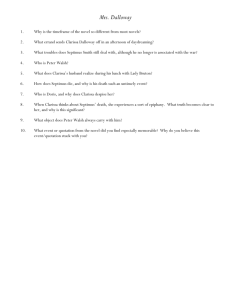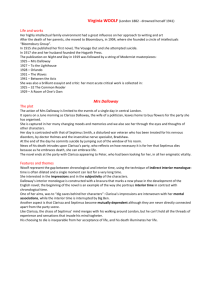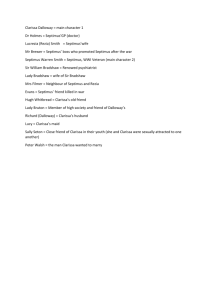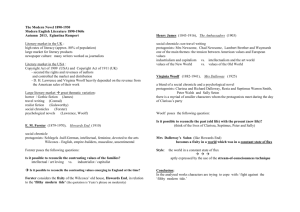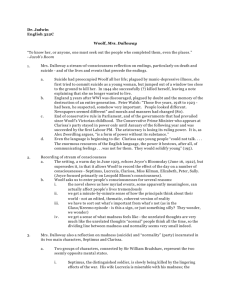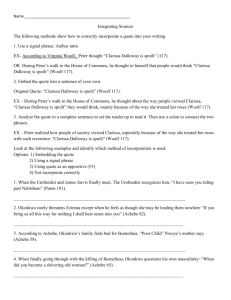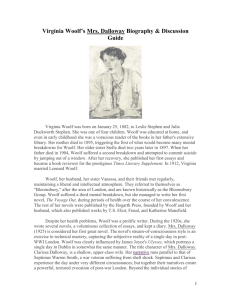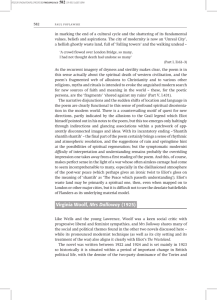Mrs Dalloway Summary
advertisement
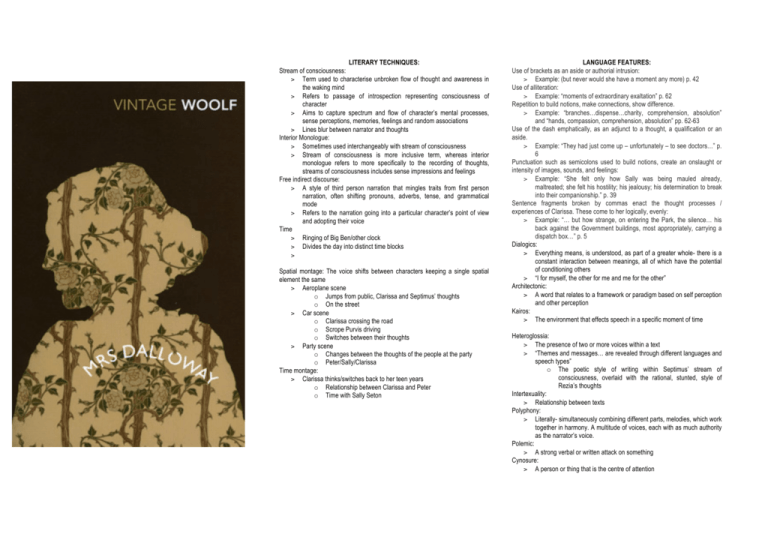
LITERARY TECHNIQUES: Stream of consciousness: > Term used to characterise unbroken flow of thought and awareness in the waking mind > Refers to passage of introspection representing consciousness of character > Aims to capture spectrum and flow of character’s mental processes, sense perceptions, memories, feelings and random associations > Lines blur between narrator and thoughts Interior Monologue: > Sometimes used interchangeably with stream of consciousness > Stream of consciousness is more inclusive term, whereas interior monologue refers to more specifically to the recording of thoughts, streams of consciousness includes sense impressions and feelings Free indirect discourse: > A style of third person narration that mingles traits from first person narration, often shifting pronouns, adverbs, tense, and grammatical mode > Refers to the narration going into a particular character’s point of view and adopting their voice Time > Ringing of Big Ben/other clock > Divides the day into distinct time blocks > Spatial montage: The voice shifts between characters keeping a single spatial element the same > Aeroplane scene o Jumps from public, Clarissa and Septimus’ thoughts o On the street > Car scene o Clarissa crossing the road o Scrope Purvis driving o Switches between their thoughts > Party scene o Changes between the thoughts of the people at the party o Peter/Sally/Clarissa Time montage: > Clarissa thinks/switches back to her teen years o Relationship between Clarissa and Peter o Time with Sally Seton LANGUAGE FEATURES: Use of brackets as an aside or authorial intrusion: > Example: (but never would she have a moment any more) p. 42 Use of alliteration: > Example: “moments of extraordinary exaltation” p. 62 Repetition to build notions, make connections, show difference. > Example: “branches…dispense…charity, comprehension, absolution” and “hands, compassion, comprehension, absolution” pp. 62-63 Use of the dash emphatically, as an adjunct to a thought, a qualification or an aside. > Example: “They had just come up – unfortunately – to see doctors…” p. 6 Punctuation such as semicolons used to build notions, create an onslaught or intensity of images, sounds, and feelings: > Example: “She felt only how Sally was being mauled already, maltreated; she felt his hostility; his jealousy; his determination to break into their companionship.” p. 39 Sentence fragments broken by commas enact the thought processes / experiences of Clarissa. These come to her logically, evenly: > Example: “… but how strange, on entering the Park, the silence… his back against the Government buildings, most appropriately, carrying a dispatch box…” p. 5 Dialogics: > Everything means, is understood, as part of a greater whole- there is a constant interaction between meanings, all of which have the potential of conditioning others > “I for myself, the other for me and me for the other” Architectonic: > A word that relates to a framework or paradigm based on self perception and other perception Kairos: > The environment that effects speech in a specific moment of time Heteroglossia: > The presence of two or more voices within a text > “Themes and messages… are revealed through different languages and speech types” o The poetic style of writing within Septimus’ stream of consciousness, overlaid with the rational, stunted, style of Rezia’s thoughts Intertexuality: > Relationship between texts Polyphony: > Literally- simultaneously combining different parts, melodies, which work together in harmony. A multitude of voices, each with as much authority as the narrator’s voice. Polemic: > A strong verbal or written attack on something Cynosure: > A person or thing that is the centre of attention CONCERNS AND PREOCCUPATIONS Mental Illness > Seen both through Septimus’ experiences and other’s reactions to it o Septimus suffers an intense neurosis as a result of his experiences in the war (PTSD) § In this way, his suicide can be seen as another casualty of war o The Doctor’s reactions to it § Dr Holmes wishes Septimus to take an interest outside of himself • Wishes him to just play cricket § Sir William Bradshaw wishes to exclude him from society • Go to the country leaving everyone behind • Needs rest § Woolf represents the two views to mental illness here • Ignoring the problem • Excluding those that suffer from it o Representative of Upper Class aversion to feeling > Septimus can be seen as feeling so much because others feel so little > Through Septimus, Woolf reflects some of her own experiences with mental illness > Stigma of mental illness is presented through Rezia o Constantly worrying that “people must see” o Ashamed of Septimus and her choice to come to London > Septimus is detached from society o Represented through his poetic stream of consciousness o Sir Bradshaw wishes him to be excluded by going to the country alone > Representative of human nature o Conformity o Shying away from what we don’t understand o Collective ignorance o Suppression and exclusion of the ‘weak’: those that feel WWI and Social Order > 1920s were the inter-war periods (post-World-War-One, pre-World-WarTwo) > War affected people in different ways, seen through characters like Rezia and Clarissa > The ‘old-world’ is changing (new technologies, new ideals) o Rise of the Labour Government § Political change more to the left § More focused on the everyday man rather than keeping the social hierarchy > Septimus feels the full effects of the war having fought in it himself o Contrasted with Clarissa who sees no change while still acknowledging that the war has happened o Representative of the emotionally detached nature of the upper class o Clarissa sees what is on the surface o Septimus sees what is going on beneath the surface § Contrast of responses between Lady Bexborough and Mrs Foxcroft • Lady Bexborough opens the bazaar and moves on with her favourite son dead • Mrs Foxcroft instead focuses on it and feels it • Represents the upper class aversion to feeling and difference in feeling > Religion was losing popularity o Result of the war § What kind of God could let such atrocities occur o Science disproving a lot of beliefs > Peter Walsh returns from India after British Colonisation o India fighting back against the British colonialists o Representing the fact that the ‘old world’ is dying > Climax of the party represents the seemingly sheltered upper class from the war > Also seen through the scene with the unknown dignitary in the car that distracts everyone o Clarissa observes that it draws the people like a “religion” § Reinforces strength of the aristocracy o Distracted at the palace gates highlight the growing shift away from reverence to the upper class § Technological advancement (such as the plane and automobile) bring the dawn of a new era Existential Angst > Raison d’être § Reason to be § Clarissa struggles with this throughout the novel as does Rezia > Life or death o Septimus and Clarissa are doubles in the novel o Septimus kills himself § Clarissa seems grateful that he did at the end of the book § Clarissa then makes the conscious choice to live > Role of Women o Existential angst over the meaningless of their lives o Trying to find things outside of their families o Finding it hard to live in a patriarchal world o sLady Bruton requires Hugh Whitbread and Richard Dalloway to help her write a letter to the times Feminism > Use of “Mrs. Dalloway” right at the start of the book and as the title o Represents how woman are defined by their husbands o Goes further when Clarissa refers to herself as “Mrs Richard Dalloway” o Strongest insignia of patriarchal power > Representation of female characters like Clarissa and Lady Bruton indicate fairly strong-minded women making decisions o Breaking away from traditional norms § Lady Bruton’s interest in Politics and ‘talking like a man’ • Challenge the gender norms § Clarissa described by Peter as being quite cold and lacking a maternal side > The way women are presented o Clarissa § Upper-class lady § “Mrs Richard Dalloway” § Acknowledges that her “happiest” moments was when she was rebelling • When she was with Sally Seton • Continually returns to that time in her life throughout her day o Rezia § Very attached to Septimus (her husband) § Defined by Septimus • Exacerbated by the fact that she is a foreigner who knows nothing and no one in London § Strong, somewhat stubborn personality Homosexuality • Represented mostly through Clarissa’s past romance with Sally Seton > Also seen through Elizabeth and Doris Kilman > Represented in the text as a “phase” o Richard Dalloway remarks this of Doris Kilman and Elizabeth’s ‘relationship’ o Almost normalising it o Not even recognising lesbianism as an actual feeling > Lessened power of religion making society more open to these notions > However, still not fully accepted or realised o Seen as just a “phase” rather than legitimate feelings Time > > > Linked with female life-cycle o Dalloway goes through Menopause o At the stage of her life where she realised she is getting old o Elizabeth appears to replace her o All ages are represented § Elizabeth – 18 § Lucrezia – 20s § Milly and Doris – 40s § Clarissa and Sally – 50s § Millicent Bruton – 62 § Helena Parry – 80s o Time continues whether you like it or not o You can’t waste time looking back, you have to look forward Link keeping all characters together Time moving forward represents the ‘old world’ slowly dying away o The new world continues to grow around the upper class who refuse to acknowledge it § Clarissa herself lives in the past • Continually looking back at her time with Sally Seton • Not noticing the new world around her CRITICAL READINGS/PERSPECTIVES Mrs. Dalloway and the Social System (Alex Zwerdling) Consciousness of both society and the Individual • The text examines how one's social environment influences the course of one's life, and focuses equally so on the societal consciousness as it does on the individual consciousness • "Woolf is deeply engaged by the questions of how the individual is shaped (or deformed) by his social environment, by how historical forces impinge • on his life and shift its course, by how class, wealth and sex help to determine his fate" Clarissa's constant introspection brings to the fore the complex reality of any individual within a modern social environment Critiquing of the English Social System: • " I want to criticise the social system, and to show it at work, as its most intense" (Virginia Woolf, in regards to her intentions for Mrs. Dalloway) • Woolf avoided outright social criticism, instead it is expressed through her satirical representations of characters • "The target of the satire was essentially the English social system, with its hierarchies of class and sex, its complacency, its moral obtuseness" Ø The prime minister: "he looked so ordinary. You might have stood him behind a counter and bought biscuits- poor chap, all rigged up in gold lace", " he tried to look somebody. It was amusing to watch" Ø Lady Bruton: her dedication to the cause of emigration is described as liberating her "pent egotism… half looking-glass, half precious stone" • Richard Dalloway directly critiques the social system on pg. 127: "the police ought to have stopped the traffic", "those cost mongers not allowed to stand their barrows", "the fault was in our detestable social system" • Characteristics/traits associated with the governing class: solidity, rigidity, stasis and the inability to communicate feelings- in turn these are attributed to their waning power, as they are unable to respond/react appropriately to the events of their time Ø "Here he was walking across London to say to Clarissa in so many words that he loved her. Which one never does say, he thought. Partly one’s lazy; partly one’s shy." Ø "doors were being opened for ladies wrapped like mummies in shawls with bright flowers on them" Ø "for miss Helena Parry was not dead: Miss Parry was alive. She was past eighty" Ø "Richard was proud of his daughter. And he had not meant to tell her, but he could not help telling her" • The party at the end of the novel serves as a kind of wake for the upper class→ "it reveals the form of power without its substance"→ contrast the solemnity surrounding the car (which was snubbed for the aeroplane: science and the modern world) at the beginning of the book with Woolf's satirical representation of the prime minister during the party scene • "Woolf gives us a picture of a class impervious to change in a society that desperately needs or demands it, a class that worships tradition and settled order but cannot accommodate the new and disturbing" • "the sense of living in the past, of being unable to take in or respond to the transformations of the present, makes the governing class in Mrs. Dalloway seem hopelessly out of step with its time" The function of Peter • He has been out of England for several years, since the war, and so he is able to externally comment on the societal transformations which have occurred over this period. "Those five years — 1918 to 1923 — had been, he suspected, somehow very important. People looked different. Newspapers seemed different. Now for instance there was a man writing quite openly in one of the respectable weeklies about water-closets. That you couldn’t have done ten years ago — written quite openly about water-closets in a respectable weekly. And then this taking out a stick of rouge, or a powder-puff and making up in public" Peter's return may be emblematic of the failing of the empire/its waning power: he returns from the colonies due to lack of success there-rebellion and uprising against the crown Ø • Introduction of the novel • By her emphatic use of 'Mrs.', Woolf draws attention to the way in which Clarissa is socially defined by her marriage • "women live their lives vicariously through their daughters, whereas men have the chance to renew their lives through action" → Clarissa vs. Peter Walsh. Peter responds to his aging (Lucy perceives him as "elderly") by attempting to regain his youth; he marries a young woman, marvels at this new world and follows women down the street (though this is arguably quite perverted and messed up), however Clarissa is continually aware of her mortality and loss-her daughter Elizabeth is turning eighteen, and thus the female cycle of sexual maturity and "flowering" is being repeated in the next generation. > Clarissa is not an individualized character at all, but merely an embodiment of society's code, an "animated mirror" of the shallow world she reflects > Governing-class spirit has increasingly come to dominate her life, the stream of her thoughts and feelings shows us that the various strata of her personality are all intact and that the movement from rebellion to conformity is not necessarily inexorable or irreversible > Septimus is Clarissa's conscience, is indeed the conscience of the governing class, though only she is willing to acknowledge him. In doing so, she sees her acceptance of the governing-class code in a highly critical light > Mrs. Dalloway captures a moment in which the domination of the ideal of rigid self-control began to seem oppressive rather than admirable > Woolf is not only fulfilling her ambition "to criticise the social system, and to show it at work, at its most intense," but contributing indirectly to its replacement by one less hostile to the buried life of feeling in every human being. > Woolf gives Clarissa her pivotal role, balancing the anesthesia of the governing class against the fervor of a Septimus Smith or Doris Kilman. HISTORICAL CONTEXT YEARS OF TRANSITION Political David Lloyd George -Elections of 1922 to 1923 saw political shift from conservative to left-leaning Labour Party -David Lloyd George loses his conservative majority and resigns in 1924 Diminishing power of Britain as a colonial power -Declaration of the Irish Free Republic -India= on its ways to independence ( Lady Bruton) Economic prosperity- with the distinctive cultural edge ‘Roaring Twenties’-For the aristocratic and wealthy characters- nightclub, jazz, cocktail bars opening in all main European cities -saw the open adoption of hedonistic lifestyles Emergence of women -During the war, many women were employed in the workplace, and continued to do so after the war -Earning wages and thus, earning a certain degree of independence -Emergence of the flapper: Independent woman-hair was cut short, dresses were shorter, smoke, drank, drove Gulf between classes -By mid 1920s, unemployment had risen to over 2 million -Poverty was widespread amongst the lower classes- contrasted strikingly with the affluence of the English upper class Modernity -World War 1 ushered in the era of modern warfare… similarly, the interwar period saw the beginning of the New Modern Age -Prevalence of cars, planes- innovations in manufacturing - Rise of cinema (Reflected in Woolf’s narrative style, incorporating cinematic techniques). Eminence of Psychological Sciences -Psychology and Sociology= Dr. William James defined ‘stream-ofconsciousness’ as ‘an unbroken flow of thought and awareness’… referring to mental processing but later used to describe new form of literature ` Post-Traumatic Stress Disorder -at the time, defined as psychological stress, characterised by dazed, disorientated state soldiers experience during or after combat -Doctors at the time considered it a physical condition caused by cowardice and weakness -Treatment proscribed would usually brief, consisting of a few days of comfort Sigmund Freud- proposed the idea of ‘war neurosis,’ -brought about by a soldier’s ‘war egos’ and ‘peace egos.’ -treated by the cathartic method of of psychoanalysis
